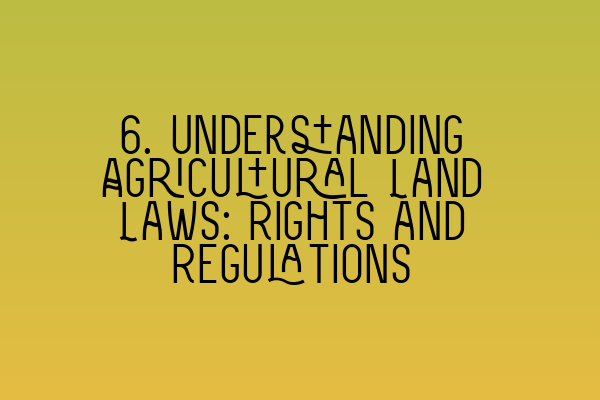**Title: Understanding Agricultural Land Laws: Rights and Regulations**
Introduction:
Agricultural land is vital for sustaining not only the economy but also the livelihood of many individuals, with a significant impact on the overall development of a country. However, due to its unique characteristics and the importance of its usage, agricultural land is subject to specific rights and regulations. As a solicitor at SQE Property Law & Land Law, I am here to shed light on the complexities surrounding agricultural land laws and provide you with a comprehensive understanding of the rights and regulations associated with it.
1. **Ownership of Agricultural Land**:
The first aspect to understand is the ownership of agricultural land. In many jurisdictions, the laws governing agricultural land differ from those concerning residential or commercial properties. To grasp this concept fully, it is crucial to distinguish between freehold and leasehold ownership. Freehold ownership grants the owner an absolute and indefinite right, while leasehold ownership provides a limited period of possession as per the terms of the lease agreement.
To delve deeper into property ownership and rights, please refer to our article on [SQE 1 Practice Exam Questions](https://fqps.co.uk/sqe/sqe1-preparation/mcq-practice-quiz).
2. **Regulations on Land Use**:
Agricultural land is subject to specific regulations regarding land use. These regulations aim to ensure the protection and sustainable use of the land, promoting agricultural activities while safeguarding the environment. Common land use regulations may include restrictions on building structures, prohibitions on certain activities that may harm the land, and guidelines on maintaining soil quality and vegetation.
For a comprehensive understanding of land use regulations, take a look at our detailed article on [SQE 1 Practice Mocks FLK1 FLK2](https://fqps.co.uk/sqe/sqe1-preparation/practice-mocks-quiz).
3. **Rights of Agricultural Tenants**:
Within agricultural land laws, various rights are granted to agricultural tenants to ensure fair and secure tenancy arrangements. These rights typically encompass the tenant’s entitlement to a secure and fixed-term tenancy, the right to compensation for improvements made to the land, and protection against unjust eviction. Understanding these rights is essential for both tenants and landlords in maintaining healthy landlord-tenant relationships.
To gain further insights into tenants’ rights in relation to agricultural land, explore our comprehensive article on [SQE 2 Preparation Courses](https://fqps.co.uk/sqe/sqe2-preparation).
4. **Regulation of Agricultural Tenancies**:
To ensure that agricultural tenancies are fair and equitable, legislation is in place to regulate the relationship between landlords and tenants. The regulations cover aspects such as rent control, termination of tenancy, and dispute resolution mechanisms. Familiarizing oneself with these regulations is crucial for both landlords and tenants to avoid legal pitfalls and resolve conflicts amicably.
For a comprehensive review of regulations regarding agricultural tenancies, we recommend reading our article on [SQE 1 Preparation Courses](https://fqps.co.uk/sqe/sqe1-preparation).
5. **Planning Permission on Agricultural Land**:
When it comes to making changes or improvements on agricultural land, it is crucial to consider planning permission requirements. These requirements ensure that any alterations to the land, such as constructing buildings, installing infrastructure, or changing land use, comply with local planning regulations. Failure to obtain the necessary permissions may result in legal complications and potential penalties.
To understand planning permission in greater detail, consult our article on [SRA SQE Exam Dates](https://fqps.co.uk/sqe/sqe1-sqe2-exam-dates).
6. **Environmental Considerations in Agricultural Land Laws**:
Given the environmental impact of agricultural activities, legislation protecting the environment is an integral part of agricultural land laws. These regulations aim to mitigate the negative effects of farming on ecosystems, water quality, and biodiversity. Understanding and complying with environmental considerations is crucial for agricultural landowners to uphold sustainable land management practices.
To explore the topic of environmental considerations in greater depth, please refer to our related article on [SQE 1 Practice Exam Questions](https://fqps.co.uk/sqe/sqe1-preparation/mcq-practice-quiz).
Conclusion:
Understanding the rights and regulations associated with agricultural land is essential for landowners, tenants, and professionals working in the field. By grasping the nuances of agricultural land laws, individuals can navigate legal complexities, ensure compliance, and contribute to sustainable land management practices. If you require professional legal advice or assistance regarding agricultural land, do not hesitate to contact SQE Property Law & Land Law.
Note: If you have any questions or need additional information regarding the SQE exams or preparation courses, please refer to our articles on [SQE 1 Preparation Courses](https://fqps.co.uk/sqe/sqe1-preparation) and [SQE 2 Preparation Courses](https://fqps.co.uk/sqe/sqe2-preparation).
